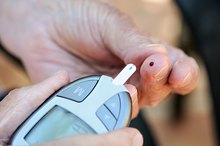Side Effects of Liquid Iron
Iron is an essential mineral. Iron enables the blood to carry oxygen to the entire body. Iron deficiency causes a disorder known as anemia, which causes fatigue, weakness, pale skin, shortness of breath, decreased ability to concentrate, dizziness and a rapid heart rate. Common causes include heavy menstruation or other blood loss, inadequate iron in the diet, genetic diseases and certain medications. Iron can be supplemented using a liquid formula. However, iron is the leading cause of accidental poisoning in children and must be kept out of their reach.
Stained Teeth
Liquid iron can stain the teeth, a side effect not noted with other forms of iron supplementation. To prevent staining of the teeth from liquid iron, it should be mixed with water or juice. Using a straw can help keep liquid iron away from the teeth. If it is to be administered by dropper, it should be placed on the back of the tongue. Iron stains on the teeth are temporary and can usually be removed by brushing with baking soda or medicinal-strength hydrogen peroxide. Do not swallow hydrogen peroxide -- it can be lethal in large doses.
- Liquid iron can stain the teeth, a side effect not noted with other forms of iron supplementation.
- To prevent staining of the teeth from liquid iron, it should be mixed with water or juice.
Changes in Bowel Movements
How Long Does Iron Stay in Your System?
Learn More
Common side effects when taking liquid iron, or any other form of iron supplementation, include constipation or diarrhea. Less common are stools that turn dark green or black, due to unabsorbed iron; this is a harmless side effect. Black stools can also result from bleeding in the gastrointestinal tract from a cause unrelated to iron -- see your doctor if you have black stools.
Increased Risk of Disease
Alcoholism, hemochromatosis, recurring blood transfusions, as well as excessive iron supplementation are common causes of excess iron. Excess iron in the body may cause heart disease by damaging arteries that supply blood to the heart. Excessive iron in the body has also been linked to an increased risk of infection, cancer, diabetes, worsening of rheumatoid arthritis, Huntington's disease and systemic lupus erythematosus. Iron supplements should not be taken by those who are not deficient.
- Alcoholism, hemochromatosis, recurring blood transfusions, as well as excessive iron supplementation are common causes of excess iron.
Warning
Side Effects of Eating Too Much Iron
Learn More
Too much iron can cause iron toxicity. Symptoms include nausea, vomiting, diarrhea and abdominal pain. These symptoms typically develop within 30 minutes to 6 hours after ingestion. Excessive fluid loss from these side effects can lead to shock. In large doses, iron is toxic to heart muscle. Iron toxicity may also cause death. Seek immediate medical attention if you experience these symptoms.
- Too much iron can cause iron toxicity.
- Excessive fluid loss from these side effects can lead to shock.
Related Articles
References
- Emergency Medicine: Recognizing and Managing Iron Toxicity
- British Columbia, Ministry of Health Practice Guidelines: Iron Deficiency -- Investigation and Management
- Abbaspour N, Hurrell R, Kelishadi R. Review on iron and its importance for human health. J Res Med Sci. 2014;19(2):164–174.
- National Heart, Lung, and Blood Institute. Iron-Deficiency Anemia.
- Vaucher P, Druais PL, Waldvogel S, Favrat B. Effect of iron supplementation on fatigue in nonanemic menstruating women with low ferritin: a randomized controlled trial. CMAJ. 2012;184(11):1247-54. doi:10.1503/cmaj.110950
- Stugiewicz M, Tkaczyszyn M, Kasztura M, Banasiak W, Ponikowski P, Jankowska EA. The influence of iron deficiency on the functioning of skeletal muscles: experimental evidence and clinical implications. Eur J Heart Fail. 2016;18(7):762-73. doi:10.1002/ejhf.467
- Cherayil BJ. The role of iron in the immune response to bacterial infection. Immunol Res. 2011;50(1):1–9. doi:10.1007/s12026-010-8199-1
- Jáuregui-lobera I. Iron deficiency and cognitive functions. Neuropsychiatr Dis Treat. 2014;10:2087-95. doi:10.2147/NDT.S72491
- Cleveland Clinic. How to Tell If You Have Iron Deficiency Anemia. Updated October 30, 2017.
- Murat S, Ali U, Serdal K, et al. Assessment of subjective sleep quality in iron deficiency anaemia. Afr Health Sci. 2015;15(2):621–627. doi:10.4314/ahs.v15i2.40
- Dosman CF, Brian JA, Drmic IE, et al. Children with autism: effect of iron supplementation on sleep and ferritin. Pediatr Neurol. 2007;36(3):152-8. doi:10.1016/j.pediatrneurol.2006.11.004
- Office of Dietary Supplements. Iron Fact Sheet for Health Professionals. Updated October 16, 2019.
Resources
Writer Bio
Gianna Rose is a registered nurse certified in hospice and palliative care, as well as a certified wellness coach. She completed Duke Integrative Medicine's Mindfulness-Based Stress Reduction course in 2009. Rose also holds a Bachelor of Fine Arts from the Savannah College of Art and Design.








